
Contact us
Our team would love to hear from you.

Today, the App Store by Apple is one of the major players in the booming mobile app market, with 1.8 million iOS apps available for users. This article focuses on iOS app development, explains the difference between native and cross-platform app creation, and unveils the top iOS programming languages, including their pros and cons. Read on!
Having been a household name for decades, Apple is famous for creating a line of smartphones, iPhones, that use the iOS mobile operating system. Initially featuring pre-installed apps on its first iPhone, released in 2007, the manufacturer launched the App Store with 500+ applications, available for download a year later. The primary goal of this app marketplace was to create a secure space for developers to distribute their software and for users to have an incredible experience with the apps. As the App Store ecosystem expanded, many developers saw great potential in building apps for iOS, which begs the question of what iOS app development entails.
iOS app development involves the creation of apps exclusively for Apple’s hardware such as the iPhone and iPad, running the iOS mobile operating system. Writing mobile apps for iOS requires using Apple’s integrated development environment (IDE), Xcode. This IDE is a graphical interface that includes an iOS software development kit (SDK), tools, and frameworks for building apps, supporting a source code for various native and cross-platform programming languages. Once the iOS app has been created, it is deployed to the App Store for end-users to download and employ.
Software developers can typically build native or cross-platform mobile apps, so it is vital to decide beforehand which approach and the corresponding technology stack are most suitable for your iOS project. The final decision is made with the target audience in mind after the evaluation of the company’s internal capabilities to build a particular app. Knowing your target market helps to determine the primary purpose of your future app, including the most important features to users. The evaluation of app-building capabilities, in turn, determines whether the skills and expertise of the company’s talent specifically target native or cross-platform apps.
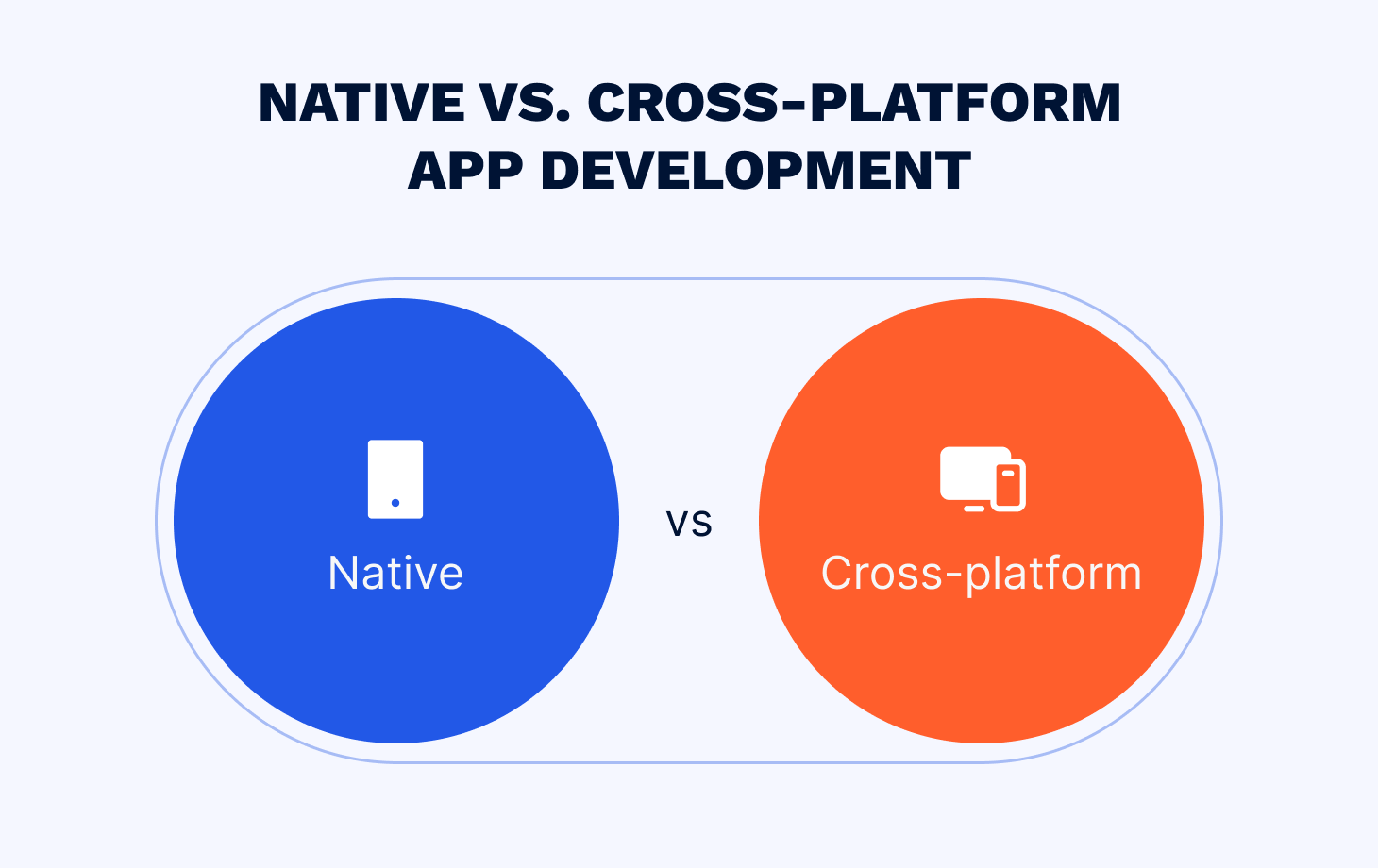
That being said, native app development revolves around building apps for a specific operating system, iOS or Android, while cross-platform app development focuses on developing apps by sharing a single codebase that runs on several platforms. Developing native apps is generally a long and costly process. However, it provides superior security, high speed, and scalability, improving app performance and user experience. On the other hand, cross-platform app building speeds up the entire development process and cuts related costs. It ensures that mobile apps are created quickly and reach broad audiences, but their performance, flexibility, and integration across various platforms are lower than those of native apps.
Overall, the best programming languages for iOS app development fall into these categories:

To code iOS apps, the following native programming languages can be utilized:
Released by Apple in 2014, Swift was designed to replace the older Objective-C predecessor and is currently considered the best programming language for iOS app development. This open-source and compiled programming language allows developers to rapidly build iOS apps with great scalability and high levels of security.
Swift has a simple and concise syntax, is interoperable with legacy Objective-C codes, and has a smooth learning curve, providing an interactive coding experience via Swift Playgrounds. Moreover, it is extremely fast, easy to maintain, and offers automatic memory management via the Automatic Reference Counting (ARC) tool, efficiently tracking memory usage to decrease its footprint. The Swift programming language also supports dynamic libraries that link existing Swift apps with newer versions of the language, eliminating the need to recompile the entire app. Despite all this, Swift has some drawbacks. Being a new programming language, it has limited community support and may cause compatibility issues with third-party tools and integrated development environments (IDEs).
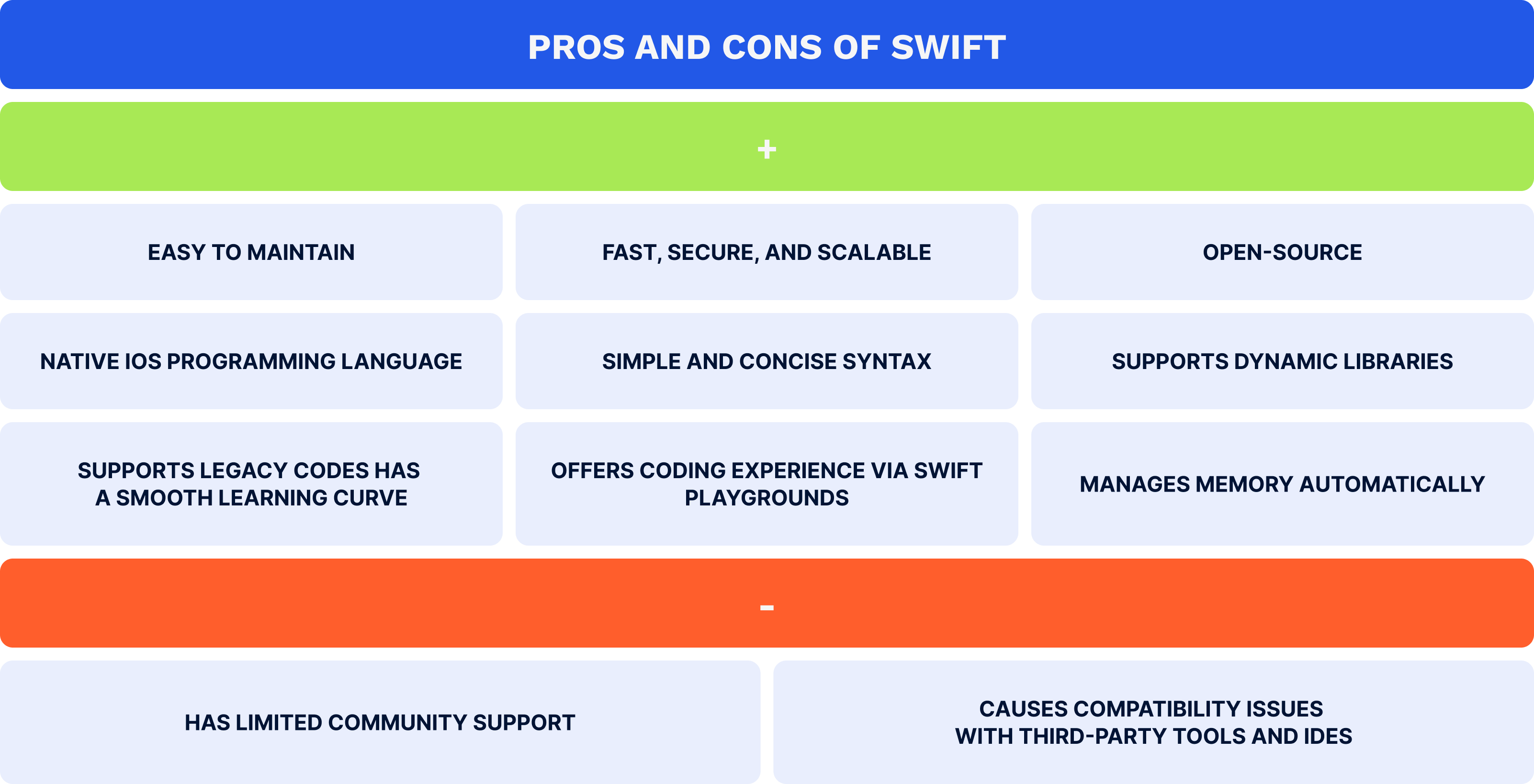
An iOS development language, used for building native apps and which is gradually being overtaken by Swift, is Objective-C. Introduced in 1984, Objective-C is a proprietary language that demonstrates object-oriented programming capabilities and is similar to the C language, especially in its syntax. Its primary case extends to maintaining and updating apps, encompassing pre-installed ones, in legacy iOS devices.
Objective-C is a mature and stable language with a big developer community, ensuring backward compatibility and providing an extensive range of frameworks and libraries for rapid app creation. It automatically manages memory with the help of the Automatic Reference Counting (ARC) and is compatible with the C programming language, making it easier to migrate code to Objective-C. On the other hand, it is an outdated programming language, featuring a complex syntax, which translates into the lack of new updates, limited functionality, and security issues when building apps.
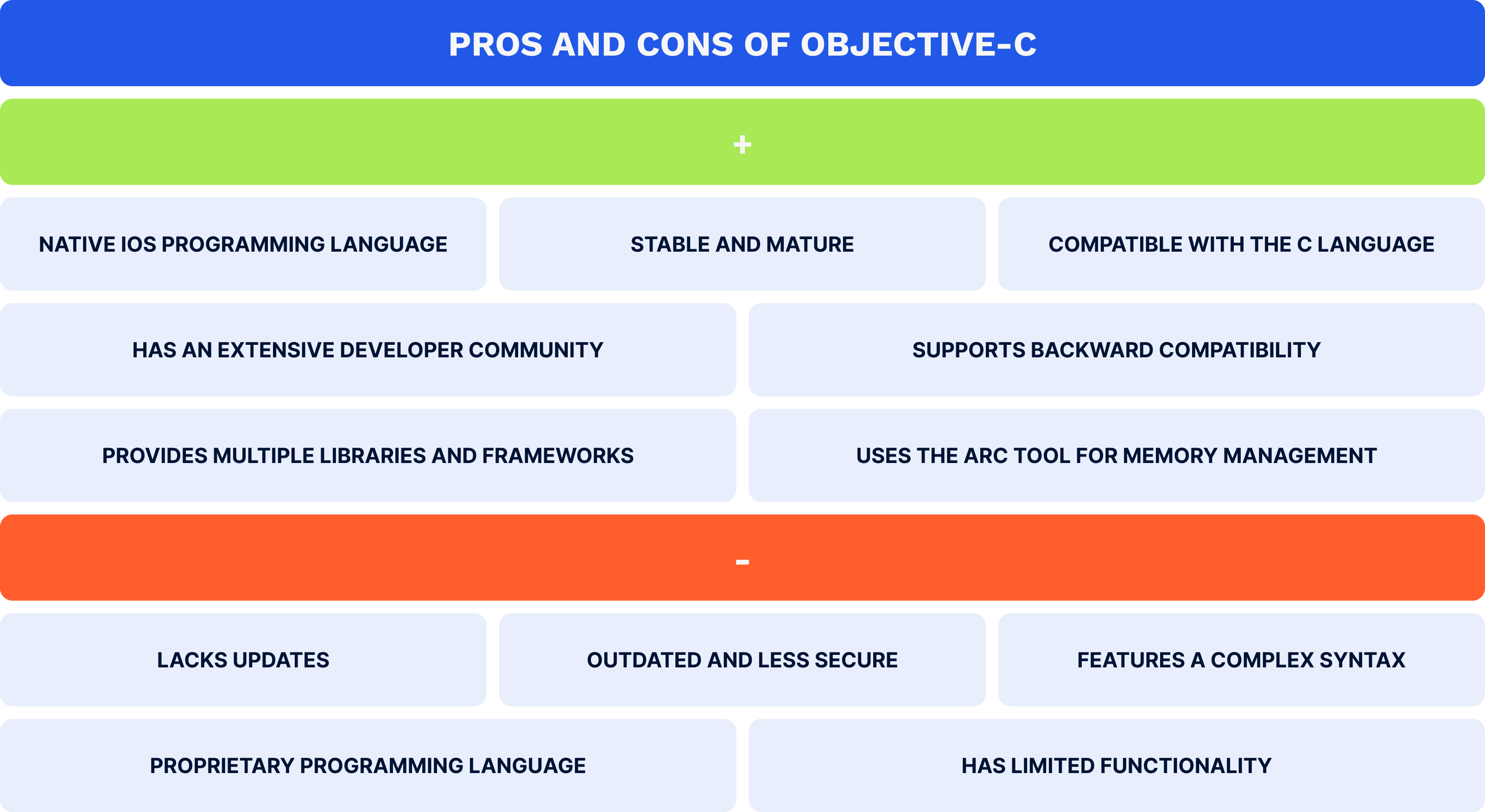

Although there is a great number of cross-platform programming languages for writing iOS apps, below are the three best options to efficiently serve this purpose:
Created by Microsoft in 2000, C# is an object-oriented programming language for developing websites, video games, and cross-platform mobile apps. Initially, it was not considered a programming language for iOS until Xamarin emerged. Xamarin is an open-source framework for building iOS, Android, and Windows apps with the C# programming language and the .NET platform. However, instead of Apple’s Xcode, it leverages the Visual Studio IDE. It is worth noting that Microsoft has recently introduced the new .NET Multi-platform App UI (MAUI) framework. It has evolved from Xamarin to facilitate the process of cross-platform app building and is scheduled to replace Xamarin by May 2024. Similar to its counterpart, .NET MAUI enables developers to create native-like iOS apps using a C# single codebase paired with Visual Studio, ensuring significant performance improvements and considerably streamlining developer processes and experience.
Coding iOS apps with C# brings many invaluable benefits since this programming language is open source, has thorough documentation and community support, and significantly speeds up the app-building process. Yet, the flip side of the coin is that this language for iOS app development has a steep learning curve, especially for novices, and offers limited functionality due to heavy reliance on the .NET platform.
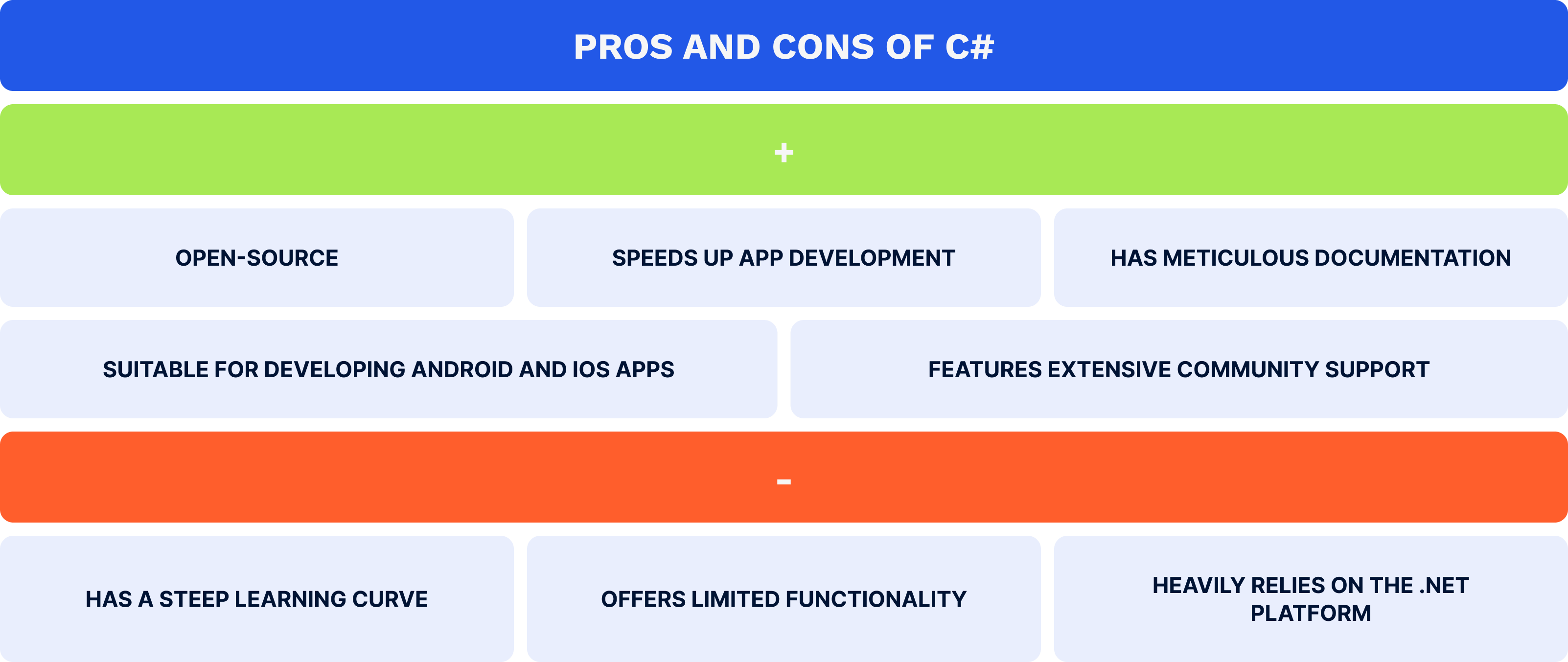
JavaScript is a general-purpose, high-level programming language created in 1995 and is now widely utilized for video game, web, and mobile app development. It alone cannot build native iOS apps, but if combined with frameworks such as React Native, it is an ideal fit for developing Apple’s apps.
The pros of this programming language are that it has broad developer support and meticulous documentation and can write iOS and Android apps from a single codebase. It is also an open-source language that is easy to learn, use, test, and debug, but it is slower than original iOS programming languages and might restrict access to specific functions and permissions of native apps.
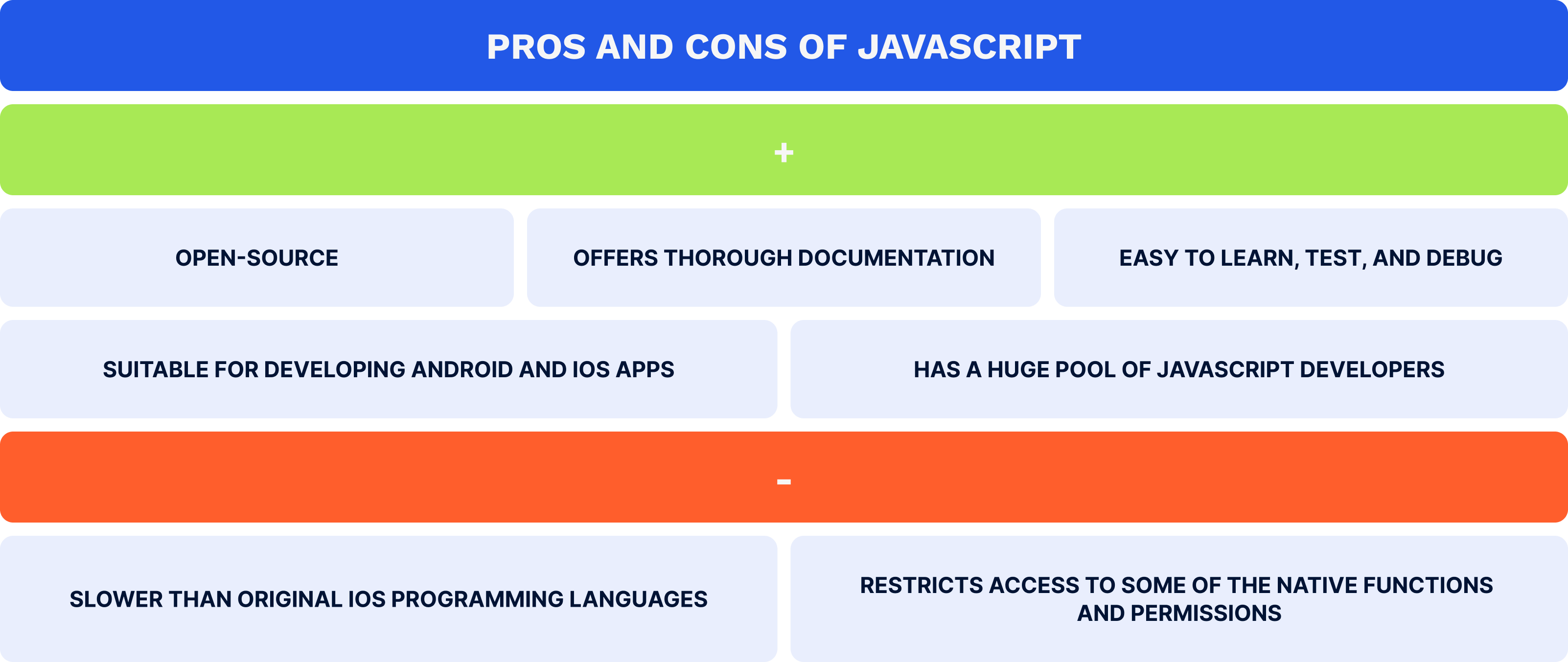
Released in 2011 by Google, the Dart object-oriented programming language has been employed for cross-platform web and mobile app development since then. It is a modern, fast, and flexible language that can be leveraged for building iOS and Android apps if paired with the Flutter framework, another Google creation.
Dart offers multi-platform support and flawless documentation, features a simple syntax, allows users to customize apps through a broad collection of widgets, and provides extensive pre-built libraries. However, Dart is a young language, leveraged by less than 7% of software developers worldwide, that offers limited community support and few online resources for tackling app development issues.
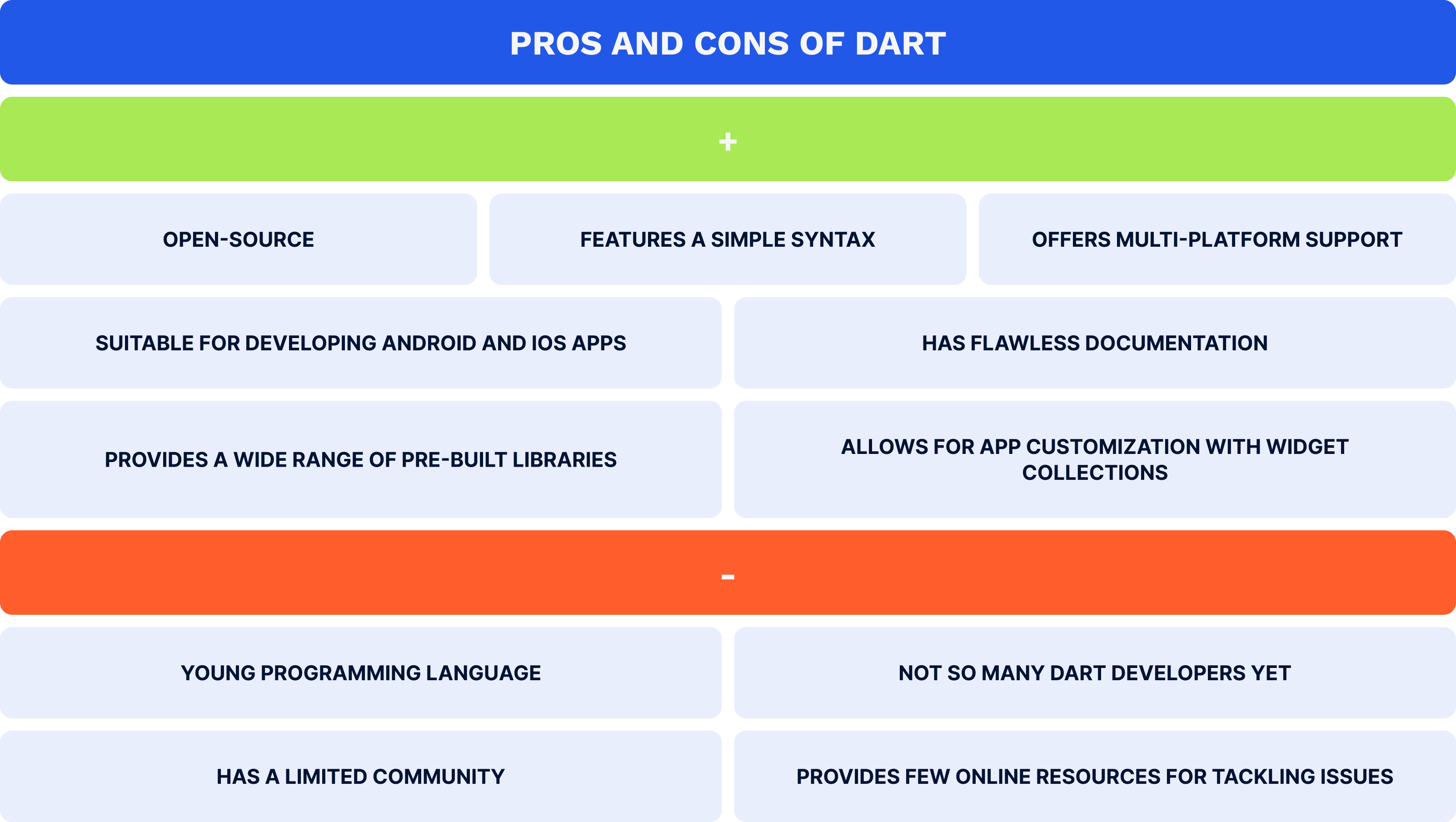
Determining which iOS app programming language is best for app writing depends on the goals your business is aiming to achieve. To ensure the iOS app’s strong performance, efficient execution, and memory management, selecting Swift is optimal. Likewise, this native iOS programming language is ideal for creating complex and scalable apps compatible with future iOS versions. However, if you need to maintain and update apps on legacy iOS devices, Objective-C should be your preferred choice. To enable versatility across multiple platforms and a broader target audience coverage, C#, JavaScript, and Dart are preferable. These cross-platform languages are also selected for building iOS apps if the company’s developers are already familiar with them, eliminating the need to learn Swift or Objective-C. Regardless of which you choose, every aforementioned programming language has proven benefits that can significantly facilitate and improve the iOS app development process.
With the launch of the original iPhone and the App Store, Apple drastically disrupted the technology market, prioritizing mobile app development as never before. While developers can choose between native or cross-platform app development, creating robust and state-of-the-art software is only feasible with iOS programming languages. Swift and Objective-C are two dominant languages for ensuring native iOS app building, but C#, JavaScript, and Dart are worth considering for writing native-like apps only in combination with their core frameworks. As iOS app development progresses steadily, you should entrust the building of your mobile applications for the App Store to expert software developers. Contact us soon and create the best-of-breed iOS apps for your audience!
Our team would love to hear from you.
Fill out the form, and we’ve got you covered.
What happens next?
San Diego, California
4445 Eastgate Mall, Suite 200
92121, 1-800-288-9659
San Francisco, California
50 California St #1500
94111, 1-800-288-9659
Pittsburgh, Pennsylvania
One Oxford Centre, 500 Grant St Suite 2900
15219, 1-800-288-9659
Durham, North Carolina
RTP Meridian, 2530 Meridian Pkwy Suite 300
27713, 1-800-288-9659
San Jose, Costa Rica
C. 118B, Trejos Montealegre
10203, 1-800-288-9659